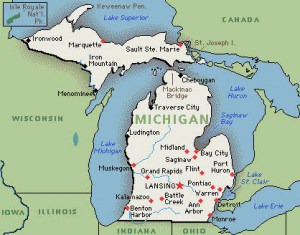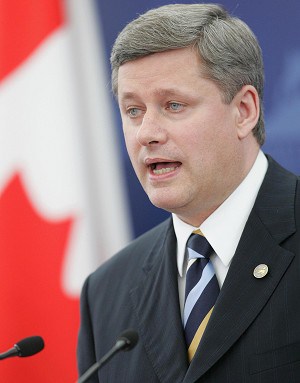Michigan Residents Protest Deregulation Bill That Could End Landlines; “Get a Cell Phone,” Says AT&T
 When Stop the Cap! reader Nancy learned earlier this year AT&T was pushing yet another deregulation bill in the Michigan legislature allowing the company to abandon landline service if and when it chooses, she called AT&T and her state representatives to protest.
When Stop the Cap! reader Nancy learned earlier this year AT&T was pushing yet another deregulation bill in the Michigan legislature allowing the company to abandon landline service if and when it chooses, she called AT&T and her state representatives to protest.
“When I called AT&T, the representative literally told me if the company ever did decide to stop offering basic phone service in Michigan, I should just ‘get a cell phone,'” Nancy reports. “Naturally they tried to sell me one of theirs and I replied I was not likely to be loyal to a company that was willing to abandon me and hundreds of thousands of other rural customers.”
As in Wisconsin, AT&T’s lobbying efforts follow the same basic playbook: use friendly legislators and dollar-a-holler groups financed in part by AT&T to push deregulation as “improving competition” and making the state “business friendly.” But as Nancy learned from experiences in Wisconsin, those are empty promises when rates go up.
“These same people pushed to deregulate cable in Wisconsin so they could offer AT&T’s cable TV service, promising lower prices if we had AT&T competing against Time Warner Cable,” Nancy remembers. “Time Warner and AT&T raised their rates for both services, instead.”
Nancy has a good memory. So do we. Yet again, AT&T’s chief Astroturfer is Thad Nation, this time under the name of the Midwest Consumers for Choice and Competition. While consumers get ignored, Nation gets time to testify before the House Energy and Technology Committee.
Nation, who runs a lobbying firm, told legislators companies like AT&T should not have to invest in old copper-lines that consumers don’t care about. He claims it prevents AT&T and other companies from investing in broadband and wireless.
The only thing missing from this group are actual consumers. Instead, their "partners" include: AT&T, groups funded by AT&T, and several chapters of the Chamber of Commerce.
In reality, legislation pushed by AT&T will allow them and other phone companies to abandon providing even basic landline service in the rural areas they no longer care about. There is no evidence (and no regulation) AT&T will invest in either broadband or improved wireless service in rural areas where the company is unlikely to quickly recoup its investment.
Our friends at the Michigan Telephone Blog pointed us to a piece in the Huron Daily Tribune, a newspaper at ground zero for rural Michigan’s potential loss of landline service should the deregulation bill pass.
Located in Michigan’s “thumb” — the northeastern part of the state separated by Saginaw Bay, Tribune reporters drilled down into the implications for the loss of traditional landline service in this largely-rural area of Michigan.
Huron County Commissioner John Bodis, who chairs the Legislative Committee, said he’s aware of the bill and foresees some issues with it, particularly in regard to the provision allowing phone companies to discontinue landline service in an area where Voice over Internet Protocol (VoIP) or cell phone service is available.
“If it’s not mandated, they’re not going to do it,” he said. “So, I’m hoping the Senate version will tweak that a little bit and hold their feet to the fire, but I don’t know.”
In its May Capitol Currents, the Michigan Township Association reported its concerns center around residents losing their land-line phone services when other options are not adequate (i.e. poor cell phone coverage because of hills, trees, etc.).
In written testimony to the House Energy and Technology Committee, Brian Groom, president of the International Brotherhood of Electrical Workers, Local 1106, stated over the past decade, the Michigan Legislature has gradually removed telecommunications providers from the oversight of the MPSC, and HB 4314 would complete that process by eliminating the last vestige of regulation — the Primary Basic Local Exchange Service.
“This service, as currently mandated in state statute, requires residential service providers to offer — at the very least — a basic calling plan to customers in their service territory,” Groom stated. “In 2005, when (M)PSC regulation of larger calling plans was eliminated, proponents argued that the public would continue to be protected by the existence of a Primary Basic Local Exchange Service requirement.”
“This means telecommunication companies providing basic local exchange or toll service will be able to discontinue or deny service to any customer who has access to ‘a comparable voice service.’ Nothing in the bill ensures that such service would be affordable, reliable or of a minimum quality,” Grooms continued. “For customers living in remote areas which are of a higher cost to serve via landlines, this legislation could result in them having to depend on higher cost and less reliable forms of telecommunication services. This bill would create a telecommunications environment where large areas of the state have no access at all to traditional landline telephone service.”
“That means people like me and my friends in places like Bad Axe, Elmwood, and Minden City — communities few people outside of Michigan would have heard of, get disconnected because they are too rural to get much attention from these companies,” Nancy says.
Frontier Communications, which provides service in some areas of the state, claims monopolies don’t exist in the phone business:
In written testimony, Bob Stewart, Frontier Communications state director of governmental affairs for Michigan and Indiana, indicated the current atmosphere is no conducive toward monopolies.
“The telecommunications industry in Michigan has moved to a highly competitive environment where monopoly powers even in rural areas do not exist,” he stated. “Unneeded and outdated regulations in the Michigan Telecommunications Act are cleaned up by HB 4314. Michigan needs to celebrate the success of the MTA by declaring victory; not over regulating simply for the sake of regulation.”
But many rural Michigan residents far from cable television and strong signal cell phone service would beg to differ.
“The further inland you head on the ‘thumb,’ the worse things get,” Nancy reports. “Much of this is farm country and they can’t even get DSL service, and cell reception might be barely adequate outside, but walk inside and your signal is gone.”
Despite consumers like Nancy getting upset when they learn the long term implications of these bills, without a public outcry it is easy for legislators to vote with AT&T. In the House, HB 4314 passed 102-6. The six standouts that stood up for consumers?
Reps. Vicki Barnett (D-Farmington Hills, Jeff Irwin (D-Ann Arbor), Steven Lindberg (D-Marquette), Lesia Liss (D-Warren), Edward McBroom (R-Vulcan) and Phil Potvin (R-Cadillac).


 Subscribe
Subscribe











